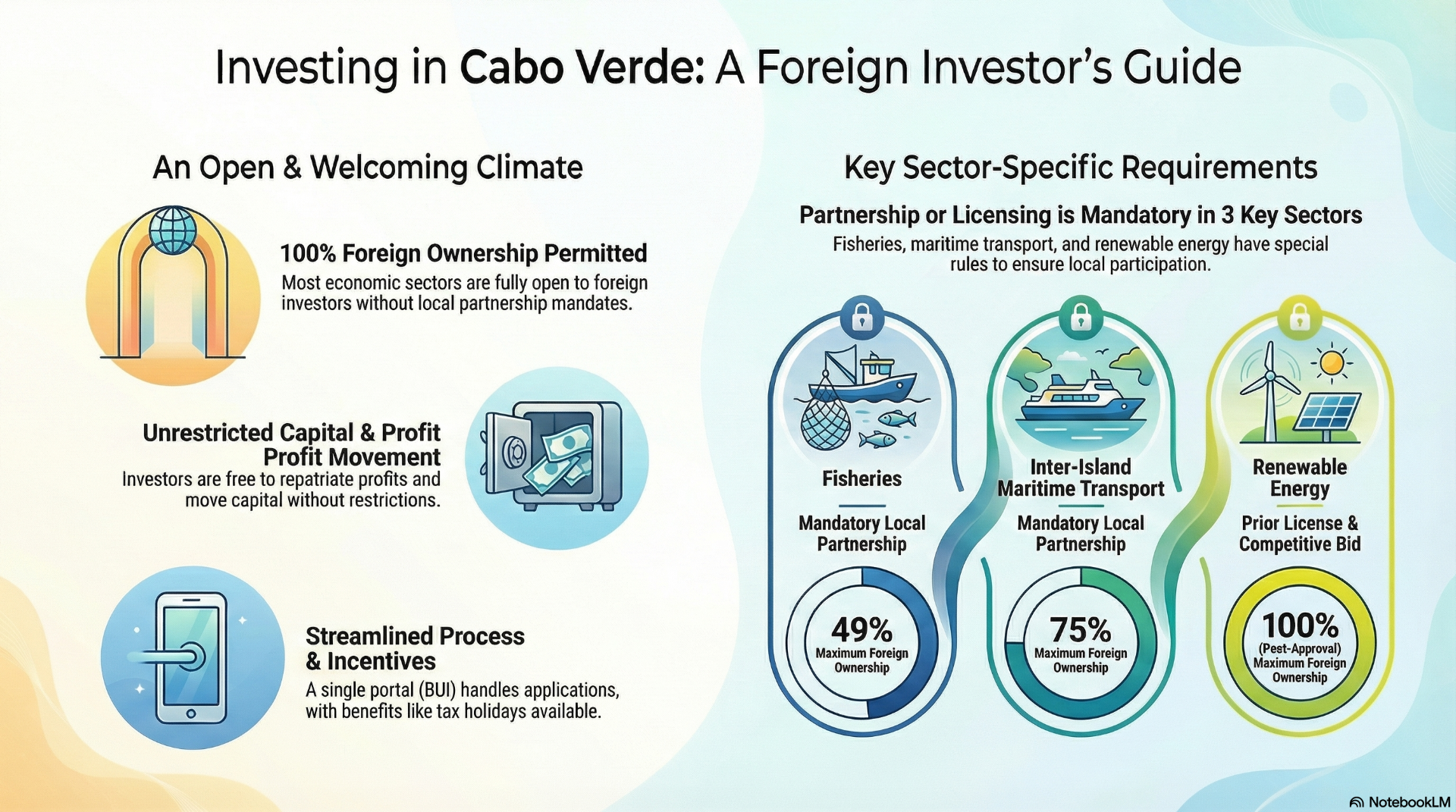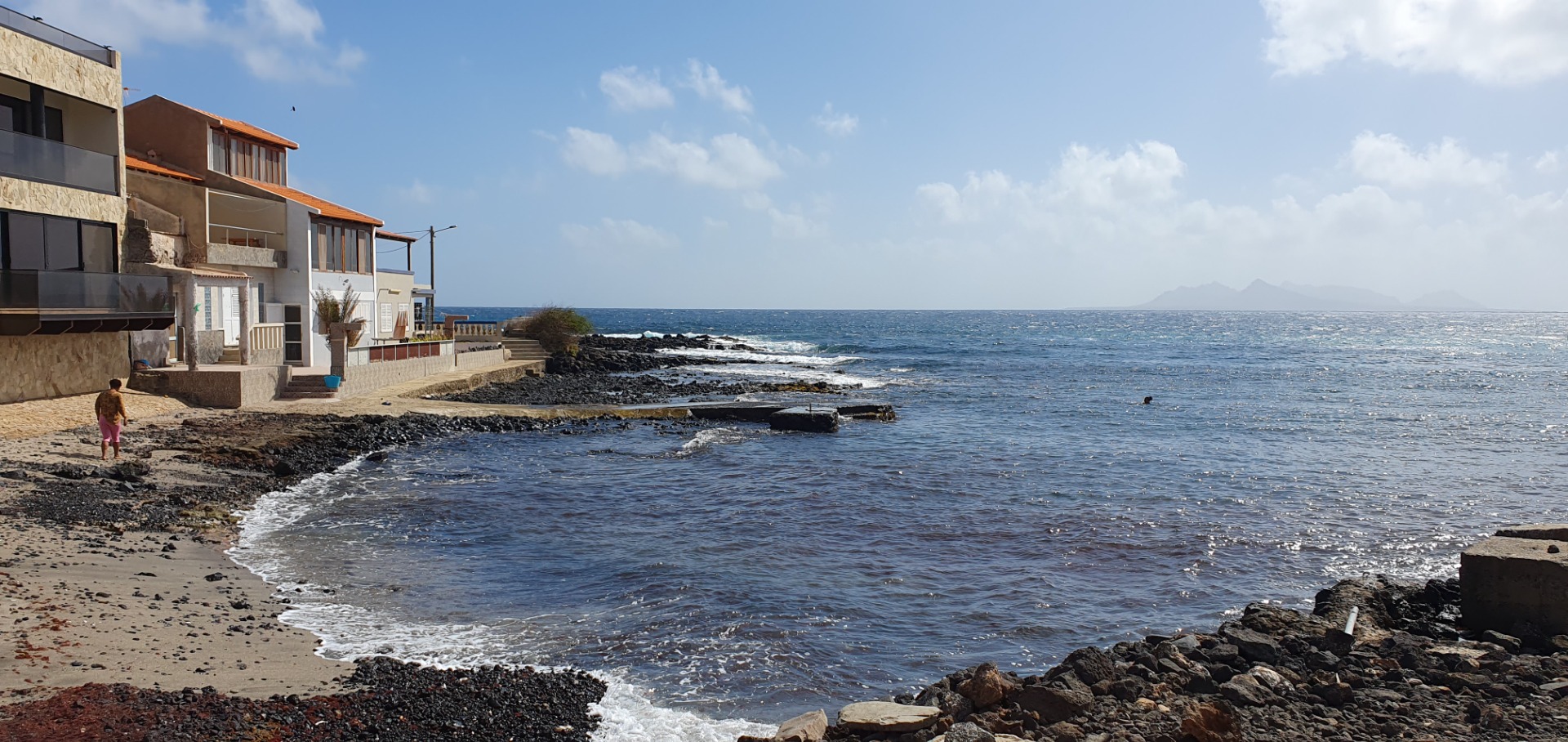
Understanding Investment Procedures for Foreign Investors in Cabo Verde

Overview of Investment Opportunities & Regulations
As a foreign investor considering opportunities in Cabo Verde—a strategic Atlantic hub with growing sectors like tourism, renewable energy, fisheries, and industry—you have the freedom to invest in virtually any sector under the country's open investment policy.
Governed by the Investment Code (Law No. 89/VIII/2013, amended 2020) and overseen by Cabo Verde TradeInvest (CVTI), this welcoming stance supports 100% foreign ownership in most areas, with no restrictions on profit repatriation or capital movement.
However, certain sectors impose specific requirements to protect national interests or ensure local participation.
The understanding these rules is crucial to navigating your investment successfully. This guide breaks down the key restrictions and procedures, ensuring you can plan effectively while leveraging incentives like tax holidays and streamlined approvals via the Balcão Único do Investidor (BUI).
General Investment Freedom
Cabo Verde encourages foreign investment across all economic activities, from setting up a resort on Sal to launching a tech startup in Praia. The Investment Code guarantees equal treatment with domestic investors, offering benefits such as a 5-10 year Corporate Income Tax (IRPC) exemption for projects creating over 50 jobs or investing more than €500,000. You can establish entities like a Limited Liability Company (Lda) or a branch, with the BUI facilitating registration in as little as 75 days. However, specific sectors have tailored rules to balance foreign capital with local involvement, detailed below.
Sector-Specific Restrictions and Requirements
While most sectors are open, three key areas—fisheries, inter-island maritime transport, and renewable energy production—carry restrictions. Here's what you need to know:
Fisheries Sector
- Restriction: If you're interested in investing in Cabo Verde's fisheries— a vital sector contributing 8% to GDP and rich with tuna and lobster resources—you must partner with local Cabo Verdean shareholders. The law mandates that Cabo Verdeans hold at least 51% of the company's share capital.
- Implication: This means you can own up to 49% of the business, with the majority stake reserved for local partners. This ensures local communities benefit from the industry, which employs over 10,000 people. You'll need to identify a reliable local partner—perhaps a fishing cooperative or established trader—and formalize the partnership via a notarized agreement.
- Process: Submit your investment proposal through the BUI, including proof of the local partnership (e.g., shareholder agreement). CVTI will coordinate with the Ministry of Maritime Economy to approve the structure, typically within 60-90 days.
Inter-Island Maritime Transport
- Restriction: For inter-island maritime transport—critical for connecting Cabo Verde's 10 inhabited islands—you must include Cabo Verdean shareholders with a minimum 25% stake in the company's capital.
- Implication: You can retain 75% ownership, allowing significant control, but the 25% local share supports national maritime interests and skilled labor (e.g., captains, crew). This sector, dominated by state-owned Cabo Verde Ports, handles 1.2 million passengers annually, offering opportunities in ferry services or cargo logistics.
- Process: Include the partnership details in your BUI application. The Ministry of Infrastructure, Transport, and Housing will review, requiring a maritime operational plan. Approval may take 90 days, with a license issued post-compliance.
Renewable Energy Production
- Restriction: Investing in renewable energy production, such as solar or wind farms to support Cabo Verde's 50% renewable energy target by 2030, requires a prior license under the general regime. Additionally, the allocation of grid connection capacity is determined annually through a competitive bidding process for the next two years.
- Implication: You cannot start construction or operations without this license, and capacity is limited by the national grid's availability (e.g., 50 MW annually on Santiago). The bidding process ensures fair access but adds a competitive layer. Incentives include a 10-year IRPC exemption and VAT relief on equipment imports, making it attractive despite the hurdle.
- Process: Submit a detailed project proposal (e.g., MW capacity, location, environmental impact assessment) via the BUI. CVTI collaborates with the Ministry of Energy and Industry to announce the annual bidding (typically Q1), with applications due by March 31. Licenses are awarded by June, followed by a 6-month construction start deadline.
Practical Steps for Compliance
- Partnership Formation: For fisheries or maritime transport, engage a local lawyer or CVTI to find compliant partners. Draft agreements specifying capital shares and roles, notarized for CVE 5,000-15,000 (~€45-135).
- Application Process: Use the BUI portal to submit your proposal, including financials, partnership proofs, and licenses (for energy). Digital tracking keeps you updated.
- Timeline and Costs: Expect 60-90 days for approvals, with costs including BUI fees (~CVE 5,000/~€45) and legal fees (~CVE 20,000/~€180 for complex cases). Energy bids may incur additional survey costs (~€5,000).
- Support: CVTI offers virtual consultations (+238 260 4110) and market data. For energy, attend pre-bid meetings to assess grid capacity.
Benefits and Challenges
- Benefits: These rules ensure local economic integration, enhancing your project's social license and access to government support. Incentives offset partnership costs.
- Challenges: Finding reliable local partners or winning energy bids requires due diligence. Delays may occur if consultations or grid studies lag—plan a 3-6 month buffer.
summary
Cabo Verde's investment framework welcomes you with open arms, but sector-specific rules in fisheries, maritime transport, and renewable energy require strategic planning. By partnering locally and navigating the BUI process, you can unlock Cabo Verde's potential—projected to grow 5% annually through 2030. Contact CVTI today to start your journey, turning these requirements into opportunities for success in this vibrant market.

.
